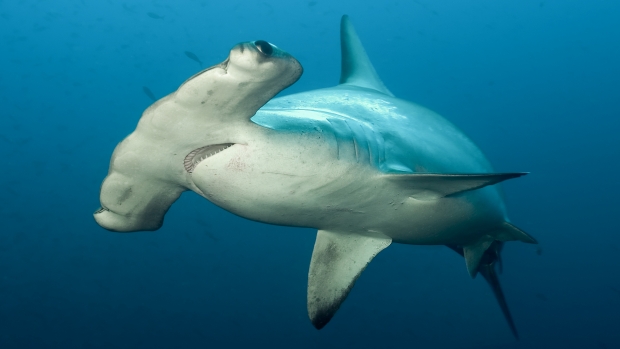Grants :: Small Grant Facilities :: Assessment of the Scalloped Hammerhead (Sphyrna Iewini) shark population and fishery to provide a basis for its sustainable management
Assessment of the Scalloped Hammerhead (Sphyrna Iewini) shark population and fishery to provide a basis for its sustainable management

The Scalloped Hammerhead shark (Sphyrna Iewini) is an import ... , Mahe, Seychelles © IUCN/SRogerson, 2015
Objectives
Sustainable management of the artisanal fishery of the Scalloped hammerhead shark (S. lewini) in Seychelles, such that ecological balance and the traditional livelihoods of artisanal shark fishers are maintained. In the process, allow Seychelles to meet its international commitments to CITES, in terms of biodiversity conservation and trade.
Background
The Scalloped hammerhead (Sphyrna lewini) is the second most common species caught in the Seychelles artisanal fishery, and is even more significant to the sub sector of the artisanal shark fishery where it is the primary catch and economically most important species.
The Convention on International Trade in Endangered Species (CITES), to which Seychelles is a Party, decided at its 16th Conference of the Parties in 2013 to list S. lewini in Appendix 2, which means as of September 2014 the export of products from this species will require a CITES permit.
To comply with its CITES obligations the Government of Seychelles can only issue such certificates where “the export will not be detrimental to the survival of the species.” The Government currently has no data on the S. lewini population and its fishery on the Mahe plateau. Under these circumstances, the likely default position would be the precautionary principle, and not issue any permits until such time as sufficient information is available to meet the CITES decision-making criteria. Such a decision would seriously undermine the livelihoods of artisanal shark fishers in Seychelles for an undetermined period of time until the required information is collected.
This MFF small grant facility seeks to address this dilemma. The project will undertake a targeted and intensive survey of the Scalloped hammerhead shark fishery in 2014. This data, coupled with the Artisanal Shark Fishery Association’s data from 2012-2013, will provide a 3-year baseline of catch, seasonality and population demographics. This will be supplemented by DNA analysis of tissue samples from adult and sub-adult specimens to determine: whether the Seychelles Scalloped hammerhead shark population is genetically distinct from others, a very important management consideration. If so, the project will determine parameters for “effective population size” e.g., mature female population. In the case that the population is not found to have a distinct genetic diversity, an indicator of population genetic health can be ascertained.
The database and genetic analysis will provide the information required to fulfil the CITES assessment criteria for the Environment Department, in its capacity as National CITES Management Authority, to properly determine the provision of CITES permits in line with international obligations. The data will also provide a basis for future monitoring and development of S. lewini fishery management provisions on the national scale and enable the sustainable management of the fishery thereby securing the related traditional livelihoods and ecological balance.
Target beneficiaries
There are three primary beneficiaries from the project: the Artisanal Shark Fishers Association in Seychelles, the National CITES Authority (Environment Department), and the Seychelles Fishing Authority. The successful implementation of the project will contribute to securing the livelihoods of traditional artisanal fishers and improve the capacity of the National CITES Authority and the Seychelles Fishing Authority to fulfill their mandates. Broader benefits of a sustainable S. lewini fishery is a balanced, productive and more resilient coastal ecosystem which will have diverse secondary beneficial multiplier effects.
About the Artisanal Shark Fishers Association
The Seychelles National Plan of Action for the Conservation and Management of Sharks (NPOA) recognised three primary stakeholders in its implementation: the semi-industrial long line fleet, the commercial dive industry and the artisanal shark fishing community. The NPOA also noted that limited capacity amongst artisanal shark fishers to coordinate their activities under and input to the steering of the NPOA represented an obstacle to its overall implementation. The formation of the Association is a fundamental step in empowering artisanal shark fishers to: protect their rights and livelihoods in a changing legislative and management environment and better manage the fishery for a sustainable future.
Outputs
The project is designed to deliver the following results:
- A database (using 3-year baseline data) for the Scalloped hammerhead shark fishery is established.
- The genetic status of the S. Iewini population is determined.
- The National CITES Authority is provided with updated data on S. Iewini to inform its permit assessment and decision-making.
Accomplishments and challenges
The peak season for the Scalloped hammerhead is during the months of July and August. This is when the bulk of mature specimens are caught and this is when the MFF ASFA project will be at its most active. However, Scalloped hammerheads are caught throughout the year in the demersal hand line fishery and particularity as by-catch in the mackerel fishery. Landings and sales of Scalloped hammerheads have therefore been monitored under the project since October 2014.
Contributions to cross-cutting themes
Climate change: Providing a baseline for sound management of marine and coastal resources promotes ecosystem resilience to pressures such as climate change.
Gender: Artisanal fishery is an almost entirely male trade not because women are excluded per se but because women in general are not traditionally attracted to the fishery industry. The project does however promote and advance fishery science and sound fishery management which as a sector has a substantial female contingent.
Project Facts
Country
Location
Shark fishery areas around the Mahe plateau, Seychelles
Topic
Duration
1st Oct 2014 to 30th Sep 2015
MFF Grant Amount
SCR 240,000
Implementing Partner
Artisanal Shark Fishers Association (ASFA)
Mr Clifford Bamboche,
Chairman
P.O. Box 1299, Central Post Office, Independence Avenue, Victoria
or c/o the Boat store, La Retraite Landing site